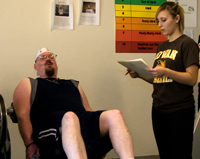Getting FIT
Getting FIT

A program developed at Rowan University is helping adults with developmental disabilities and their caregivers get fit and stay fit, and it's preparing the next generation of trainers to help a population with special needs.
The Get FIT program, now in its third year at Rowan, this year paired 40 Health Promotion and Fitness Management students with 25 developmentally challenged adults and their caregivers. Clients and caregivers meet with students for one-on-one training sessions three times a week and discuss strategies for improving their health through better diet, quitting or avoiding tobacco and alcohol use, and making good life choices.
"The clients and caregivers work with a fitness trainer to improve cardiovascular health, strength and flexibility," said Dr. Leslie Spencer, coordinator of the HPFM program, one of three specializations within the Department of Health and Exercise Science in the College of Education.
In addition to helping clients and caregivers achieve fitness goals, the program helps clients build stress management and social interaction skills.
Spencer said the dual client/caregiver focus is especially important because caregivers often sacrifice their own well-being to take care of loved ones.
"They participate in the fitness sessions and get the nutritional counseling too," she said.
The counseling involves a personal dietary assessment based on a food log that clients and caregivers keep. Spencer said developmentally challenged adults tend to be sedentary and are at risk for health problems because of it.
"This is a population with higher than average levels of obesity, diabetes, high blood pressure, high cholesterol and stress," Spencer said. "But we've seen remarkable changes in our clients. We've seen clients lose weight and we've had clients go off diabetes medication because they lost weight."
And there have been other dramatic improvements in clients' lives and outlooks such as one, who was almost completely non-verbal when he began the sessions, who started speaking.
"We can't say why, exactly, but the workouts and interaction evidently helped," Spencer said. "This just seemed to be a turning point in his life."
HPFM majors pursue a variety of career paths, from fitness center management to corporate and county health settings. Some also earn teacher certifications and some use the program as a springboard for graduate school in such fields as physical and occupational therapy.
Get FIT (Fitness Integration Training) was developed with The Family Resource Network, a state-wide non-profit organization, and received funding through the New Jersey Council on Developmental Disabilities.
Barb Wilhite, an adjunct in H.E.S. who also works with The Family Resource Network, said Get FIT will soon be expanded to a YMCA, a private fitness club and to a personal trainer who works with developmentally challenged adults.
"We had two primary goals when we started the program," Wilhite said. "We wanted to improve the health of people with developmental disabilities and their caregivers and we wanted to increase the capacity of the field (fitness professionals trained to work with adults with developmental disabilities). I'm happy to say we've done both."
